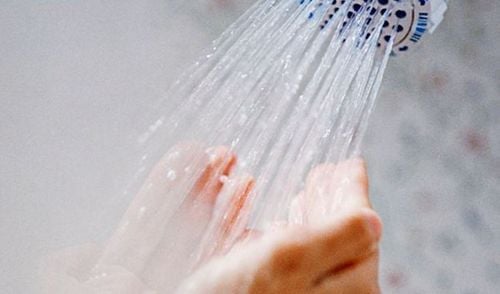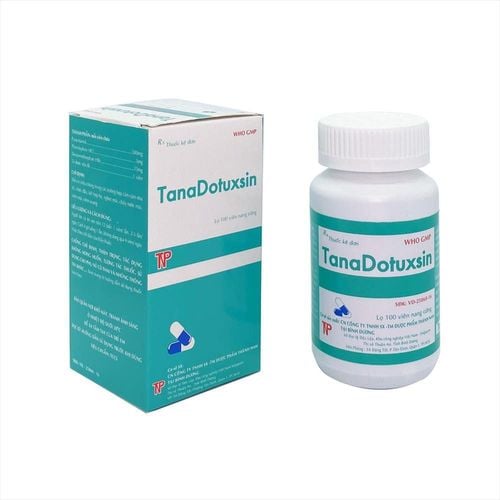This is an automatically translated article.
When people have a cold or flu, they often experience unpleasant symptoms such as a stuffy nose, shortness of breath, or a cough. When these problems occur at night, they can be disruptive and significantly affect the quality of your sleep. So how to solve this situation?
1. Drink warm drinks
The habit of drinking warm water before going to bed can soothe a sore throat and other flu symptoms, helping you to have a good night's sleep when you have a cold. You can drink decaffeinated teas with honey, such as chamomile tea, ginger tea, or mint tea. These teas all have high antioxidant properties, which help you breathe, relax and fight infections very effectively.
In addition to warm tea, you can also try sipping some of the following other drinks:
Hot soup. Hot water mixed with lemon juice and honey. Broth contains less sodium. According to health care experts, people with colds and insomnia should try to drink warm drinks about 60-90 minutes before going to bed. Drinking liquids too close to bedtime can cause you to wake up to go to the bathroom during the night.
2. Use of NSAIDs
If the flu is causing you aches and pains all over your body and disrupting your sleep, you can get relief quickly with an over-the-counter non-steroidal anti-inflammatory drug (NSAID). These medications work to improve some of the symptoms caused by colds, including muscle aches, fever, headache, or earaches.
Some popular over-the-counter NSAIDs that you should choose to overcome your cold, include:
Ibuprofen , such as Motrin, Midol and Advil. Aspirin. Naprogen (Aleve). However, as with any over-the-counter medication, you need to take it exactly as recommended and follow the instructions for dosing the medication carefully. In case of high fever, you should avoid taking NSAIDs for 3 days in a row. Or if you feel body aches, avoid taking this medication for more than 10 days and see your doctor if symptoms persist.

Sử dụng thuốc NSAID giúp bạn ngủ ngon khi bị cảm
3. Use a decongestant
Insomnia is a common concern in many patients. To solve this situation, patients can use decongestants to effectively repel flu symptoms.
Decongestants work mainly by reducing swelling in the tissues in the nose, while also reducing mucus production. This can help you breathe easier, especially while sleeping.
Currently, decongestants are sold in most pharmacies, including 3 main forms, including spray, oral tablet or drop. However, this drug is generally not recommended for use in children under 3 years of age. In addition, you should not overuse decongestants because long-term use can make flu symptoms flare up again, worse.
4. Cough medicine
To sleep well when you have a cold, you need to treat nocturnal coughs as soon as they appear. Coughs caused by colds often disrupt sleep and cause fatigue and exhaustion in patients the next morning. Therefore, over-the-counter cough suppressants are often recommended for temporary relief of cough in this case.
If your cough is mixed with phlegm, consider using an expectorant, which thins mucus in your lungs and makes it easier to breathe. Some popular cough suppressants, such as Mucinex DM or Mucinex.
Another symptomatic treatment option for coughs caused by colds and flu is cough reflex inhibitors, also known as antitussives. This medicine is an ideal option for colds and flu people who have trouble sleeping at night due to a cough, such as Robitussin DM.
Some cough medicines also contain pain relievers, decongestants, or antibiotics. The presence of these ingredients can pose a health hazard if used in higher than recommended doses.
5. Gargle with salt water
Gargling with salt water before going to bed will help you soothe a sore throat, and prevent the progression of an infection, thereby providing a good night's sleep when you have a cold.
You can apply the simple homemade salt water rinse below:
Mix 9g of salt with 1 liter of warm water to achieve a standard concentration of 0.9%. After the salt is completely dissolved in the water, gargle the mixture at the back of your throat for long enough. Then swish the salt water around your mouth before you spit it out.
6. Use salt water to wash your nose
According to a new study, rinsing your nose with salt water can help relieve nasal congestion caused by the flu, while clearing mucus and germs and making it easier to breathe.You can wash your nasal passages with physiological saline or dilute saline solution yourself. However, if you're making your own at home, you'll need to use distilled, sterile, or previously boiled water to get rid of bacteria. In addition, the FDA also does not recommend that parents arbitrarily use saline nasal irrigation for children under 2 years of age, unless approved by a pediatrician.

Để ngủ ngon khi bị cảm bạn có thể sử dụng nước muối để rửa mũi
7. Elevate your head while sleeping
Insomnia can occur due to mucus accumulation in the throat when you lie down with your head too low. This will trigger a cough and cause sleepless nights.
To improve symptoms of cough, stuffy nose and help you sleep well when you have a cold, you can add extra pillows to raise your head a little. At that time, the phlegm in the throat will be significantly reduced. However, you should avoid using too many pillows as it can cause you neck pain and additional discomfort while sleeping.
8. Use a humidifier
Dry air can cause sinus irritation and worsen flu symptoms. Therefore, you should add moisture to the air by using a humidifier.
Besides, you should also use purified water or distilled water for the humidifier. In addition, it is necessary to change the water daily as well as regularly clean the machine to prevent bacteria from growing and attacking the body through the nose.
9. Take a warm bath
The warm steam from the shower can help thin and remove mucus in your sinuses, making it easier to breathe. On the other hand, a warm bath is also a great way to relax before going to bed, helping you sleep well when you have a cold.
For a spa-like experience, you can take some scented bath tablets containing eucalyptus or peppermint oil. When inhaled, the cooling effects of these ingredients can help improve your stuffy nose.
10. Avoid drinking too much alcohol
Although alcohol is a factor that can make you feel more sleepy, it is still best to avoid drinking alcohol before bed. This is because alcohol can disrupt the quality of your sleep, especially during colds. In addition, alcohol is a diuretic, blocking antidiuretic hormones and stimulating the kidneys to produce more urine. At that time, you will tend to urinate more often at night, causing severe insomnia.
11. Keep the bedroom cool
According to a recent study, bedroom temperature is one of the top factors that can affect the quality of your sleep. This is especially important when you are dealing with fevers and colds.
To create a comfortable sleeping environment and help you sleep well when you have a cold, keep the room temperature between 60 - 67°F (15.6 and 19.4°C). To accomplish this, you can adopt a few strategies:
Use a thermostat and adjust the room temperature appropriately in the 60 - 67°F (15.6 and 19.4°C) range ) is best during sleep. Open a window or turn on the air conditioner if the temperature rises. Place the fan near an open window to improve air circulation.
12. Use topical ointments
You can also improve the quality of your sleep and relieve symptoms of a stuffy nose or cough through topical ointments for the neck and chest area. In these drugs often contain ingredients such as:
Menthol: Has a soothing and cooling effect on the throat, making it easier to breathe while sleeping. Eucalyptus Oil: Contains cineole, which helps loosen sticky, thick mucus in the throat. Camphor: Helps stop coughing and loosens mucus in the throat area. While these ingredients may not cure a cold, they can help you breathe easier and sleep more comfortably. When applying ointment, you should only apply it to the chest and neck area, avoid applying it inside the nose because it can be absorbed into the body through the membranes inside your nasal passages.
In addition, you should also test a small amount of ointment on the skin under the arm before using it extensively. This medicine can sometimes cause skin irritation in some people with sensitive skin.
Please dial HOTLINE for more information or register for an appointment HERE. Download MyVinmec app to make appointments faster and to manage your bookings easily.













